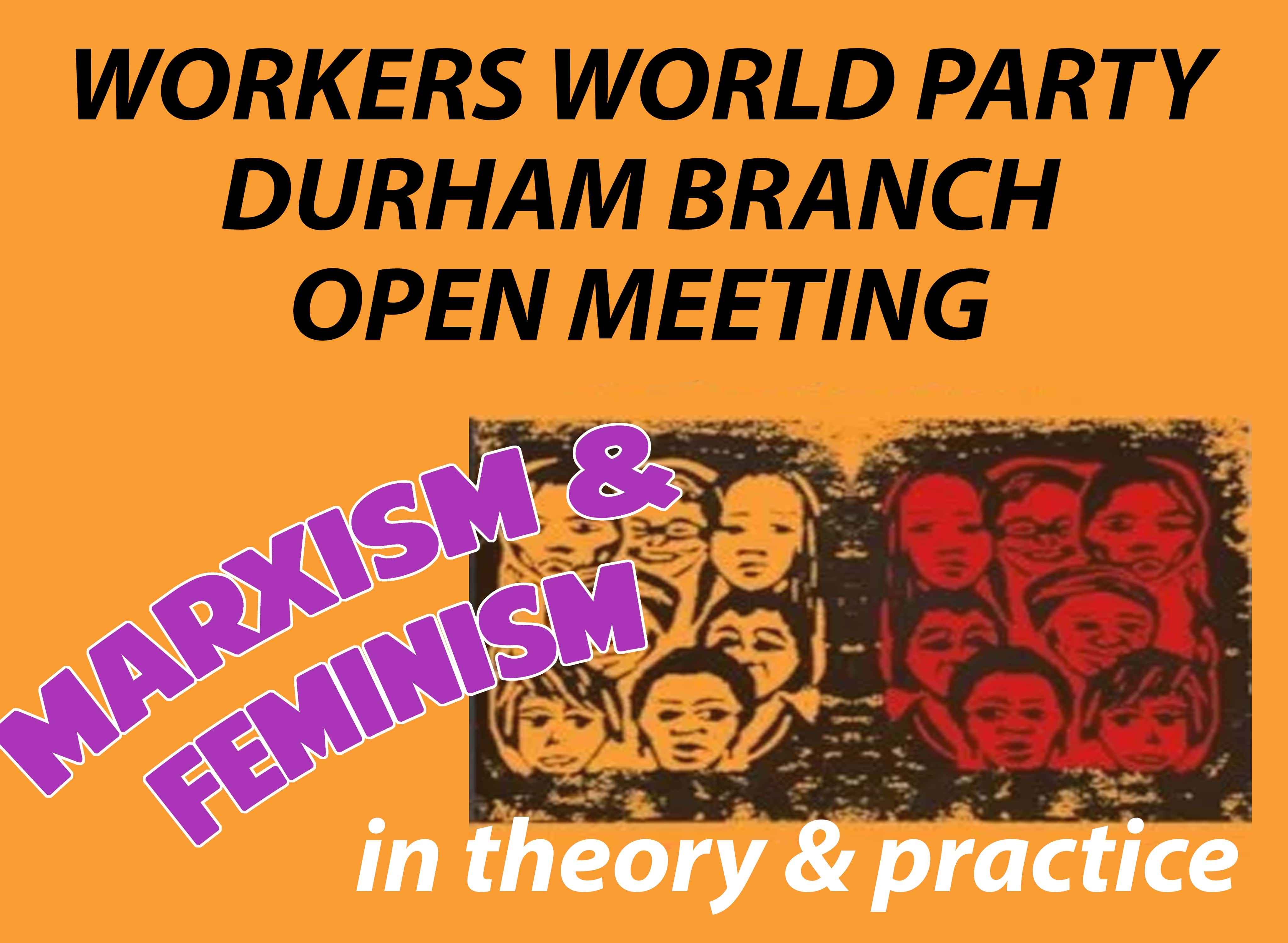

A thorough Marxist critique of class society is essential to a truly liberatory feminism, argued members of Workers World Party at a public meeting here Nov. 10.
Organized and facilitated by Durham WWP’s Logan Emil, Meghan Watts and Taylor Cook, the meeting was held at the club and event space Nightlight. Before a full room, Emil, Watts and Cook gave a materialist analysis of the systemic oppressions facing women and LGBTQ individuals, detailed WWP’s historical role in these struggles, and then led a discussion on how to advance the causes of feminism and LBGTQ rights in the era of #MeToo.
“There was a time when patriarchy didn’t exist,” said Emil, laying out the historical development of “women” as a specific class in society as detailed by Marxists like Friedrich Engels and WWP’s Dorothy Ballan. Emil explained that patriarchy was a product of the division of labor between women and men, the development of private production and surplus value by men, and a focus on securing and maintaining familial wealth through inheritance, among other things.
Emil, Watts and Cook utilized a passage from Ballan’s groundbreaking 1971 work “Feminism and Marxism” to further explain their point: “The conversion of social property to private property eventually meant even the conversion of humans to private ownership. … This became transformed into its opposite, with marriage and childbearing isolating and insulating women from social production, making her totally dependent on her husband, and reducing her to the role of procreation for inheritance, and to the role of servant for husband.
Much of the meeting’s most engaging discussion came when the three detailed the differences between bourgeois and Marxist feminisms, particularly the “white” nature of bourgeois approaches, which explicitly and implicitly center the white, monied woman’s struggle as central to the struggles of all women, including those who are subject to special oppressions due to race, gender identity and/or sexuality.
A truly comprehensive liberatory movement, they said, would incorporate a systemic analysis of who suffers most under capitalism and why. They cited WWP’s Monica Moorehead, who wrote in 2017 that the “feminization of labor manifests itself with women workers, especially the most oppressed women, Black, Latinx and Native, being in the forefront of not only economic struggles, but also leading in political struggles. Those range from the Fight for $15 and a Union movement, to Indigenous water rights at Standing Rock, Black Lives Matter led by Black trans women and, of course, the struggle for reproductive justice.”
The danger of a bourgeois/white approach to feminism, said Cook, was its tendency to provide false solutions, to focus on efforts to “shatter the glass ceiling rather than the structures that created it.”
“Bourgeois feminism has a tendency to disregard any racial or class analysis,” stated Watts, but “feminism and women’s liberation are inherently a form of class struggle.” She said, “When we think of women workers across the whole population — Black women, LGBTQ women, etc. — we see that there are very real disparities there.”
Moreover, in the era of #MeToo — a movement the three noted was started by Tarana Burke, a Black woman — the hollow promises of liberal/bourgeois feminism are increasingly difficult to square with the lived experiences of so many. “Even the ‘right kind’ of woman cannot achieve justice within this system,” Watts said, pointing to the example of Christine Blasey Ford, whose Sept. 27 testimony against Brett Kavanaugh during confirmation hearings to consider his nomination as a U.S. Supreme Court Justice riveted the nation. Despite several credible accusations of sexual assault, Kavanaugh was still confirmed.
“Capitalism is the vehicle as well as the means of creating these oppressions,” Cook continued. She added that although bourgeois feminism can provide some immediate gains, it often comes at the price of buttressing other oppressions — particularly those against already-marginalized racial, class and gender groups. It can be difficult for those who benefit from bourgeois structures to accept their own culpability, Cook said. “When you’re a part of any oppressing group, it’s easy to want distance — but we have to accept the truth if we want to destroy those oppressions.”
The following call, “Gaza cries out to you – A global solidarity week to support…
Ever since the Donald Trump/Elon Musk administration took the reins of power in late January,…
The following is a letter from Workers World Party to the Workers Party of Korea…
Statement of the anti-imperialist Citizens’ Pole organization in Panamá, issued April 10, 2025. Translation: John…
Philadelphia Philadelphia’s transit system, the Southeastern Pennsylvania Transit Authority (SEPTA), released a budget on April…
By Gary Wilson The following is a guest article published first on April 10, 2025…